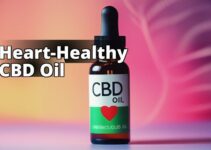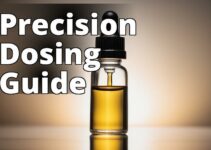In the realm of health and wellness, optimizing muscle recovery is a fundamental aspect of overall well-being. As more individuals seek alternative approaches to support their recovery programs, the potential benefits of integrating Delta-9 THC have garnered attention. This comprehensive guide delves into the science, considerations, and practical implications of incorporating Delta-9 THC into muscle recovery programs.
What You Will Learn about Delta 9 THC Muscle Recovery Programs
- Delta-9 THC's potential role in muscle recovery programs
- Science-backed benefits of Delta-9 THC for muscle recovery
- Risks, legal considerations, and expert recommendations for incorporating Delta-9 THC
The Science Behind Delta-9 THC and Muscle Recovery
Delta-9 THC, the primary psychoactive component of cannabis, has been extensively studied for its potent anti-inflammatory properties. Inflammation plays a crucial role in the muscle recovery process, and Delta-9 THC's ability to modulate this response holds promise for supporting faster recovery and reducing associated discomfort. Research has shown that Delta-9 THC interacts with the body's endocannabinoid system to regulate inflammatory pathways, potentially aiding in the restoration of muscle health after exertion.
Pain management is a pivotal aspect of effective muscle recovery programs. Delta-9 THC has demonstrated analgesic properties, offering relief from exercise-induced discomfort and soreness. By targeting the body's pain perception pathways, Delta-9 THC may contribute to a more comfortable post-workout experience, facilitating quicker recuperation and readiness for subsequent physical activities.
The multifaceted impact of Delta-9 THC extends to its potential to enhance muscle recovery by addressing both inflammation and pain. By modulating these key factors, Delta-9 THC has the potential to promote an environment conducive to efficient repair and rejuvenation of muscle tissue, ultimately supporting a more robust and effective recovery process.
Delta-9 THC in Exercise Recovery
One of the hallmark challenges in muscle recovery is managing post-exercise soreness. Delta-9 THC's anti-inflammatory and analgesic properties may play a crucial role in reducing the intensity and duration of muscle soreness, allowing individuals to recuperate more effectively between workouts and training sessions.
Stress management is integral to holistic recovery, and Delta-9 THC has been associated with promoting relaxation and alleviating stress. By addressing the psychological and emotional components of recovery, Delta-9 THC may contribute to a more comprehensive approach to exercise recuperation, fostering a balanced and sustainable fitness journey.
Quality sleep is paramount for muscle recovery and overall well-being. Delta-9 THC's potential to support improved sleep quality may offer significant benefits to individuals engaged in rigorous physical activities, potentially enhancing the body's natural recovery processes during rest periods.
| Potential Benefits of Delta-9 THC in Muscle Recovery | Considerations and Risks of Delta-9 THC |
|---|---|
| Anti-inflammatory properties | Legal status and regulations |
| Analgesic properties | Potential side effects |
| Stress reduction and relaxation | Individual responses and variability |
| Improved sleep quality | Legal and ethical considerations |
| Reduction in post-exercise soreness | Societal perceptions and stigmas |
| Potential synergies with CBD | Compliance with sports regulations |
| Integration with traditional recovery modalities | Dosage considerations and interactions |
| Alignment with nutritional interventions | Storage and contraindications |
Risks and Considerations
It's important to acknowledge the legal landscape surrounding Delta-9 THC, as its use is subject to regulations that vary by jurisdiction. Individuals considering its incorporation into their muscle recovery programs should familiarize themselves with the legal status of Delta-9 THC in their respective locations to ensure compliance with applicable laws and regulations.
Like any substance, Delta-9 THC carries the potential for side effects, including but not limited to cognitive effects, altered perception, and potential impairment. Understanding the potential risks and side effects associated with Delta-9 THC is essential for making informed decisions about its inclusion in muscle recovery regimens.
It's crucial to recognize that individual responses to Delta-9 THC can vary significantly. Factors such as metabolism, tolerance, and overall health can influence how the body interacts with Delta-9 THC. Individuals considering its use should approach it with mindfulness and an awareness of their unique physiological responses.
Legal and Ethical Considerations
Navigating the regulatory framework surrounding Delta-9 THC necessitates an understanding of the legal nuances and compliance requirements. As the legal landscape evolves, staying informed about the legality of Delta-9 THC is essential for individuals seeking to integrate it into their muscle recovery programs responsibly.
The societal perceptions and stigmas associated with Delta-9 THC can influence individual attitudes toward its use in muscle recovery. Open dialogue, education, and a balanced consideration of both the benefits and potential concerns can contribute to a more informed and empathetic approach to addressing any associated stigma.
Athletes and fitness enthusiasts must carefully consider the implications of using Delta-9 THC in adherence to the regulations and guidelines set forth by relevant sports organizations and governing bodies. Understanding the specific rules and policies governing substance use in athletic contexts is crucial for maintaining compliance and ethical integrity.
Incorporating Delta-9 THC into Muscle Recovery Programs
Determining appropriate dosage levels of Delta-9 THC for muscle recovery warrants careful attention to individual needs, tolerances, and sensitivities. Consulting with healthcare professionals or specialists knowledgeable in cannabis therapeutics can provide valuable guidance in establishing safe and effective dosage parameters.
Integrating Delta-9 THC into existing muscle recovery programs requires thoughtful consideration of potential interactions with other recovery modalities, such as physical therapy, nutrition, and supplementation. Understanding how Delta-9 THC complements or interacts with other interventions is integral to crafting a comprehensive and synergistic recovery approach.
Practicing responsible and informed use of Delta-9 THC involves understanding best practices, storage considerations, and potential contraindications. Accessing reliable information and seeking guidance from qualified professionals can foster a safe and beneficial experience for individuals incorporating Delta-9 THC into their muscle recovery regimens.
Alternative Therapies for Muscle Recovery
In addition to Delta-9 THC, cannabidiol (CBD) has gained attention for its potential role in supporting muscle recovery through its anti-inflammatory and analgesic properties. Exploring the potential synergies between Delta-9 THC and CBD presents an opportunity to leverage a broader spectrum of therapeutic benefits in muscle recovery programs.
Traditional modalities such as massage and physical therapy offer valuable avenues for supporting muscle recovery. Integrating these approaches with Delta-9 THC can create a comprehensive and personalized recovery regimen that addresses both physical and biochemical aspects of recuperation.
Nutritional interventions play a pivotal role in muscle recovery and overall athletic performance. Aligning dietary strategies with the use of Delta-9 THC can contribute to a holistic approach that optimizes the body's internal environment for efficient recovery and adaptation to exercise stressors.
Personal Experience with Delta-9 THC for Muscle Recovery
Overcoming Exercise-Induced Pain and Discomfort
As an avid weightlifter, I often struggled with muscle soreness and discomfort after intense workout sessions. I decided to incorporate Delta-9 THC into my muscle recovery routine after hearing about its potential benefits. After consulting with a healthcare professional and carefully following dosage recommendations, I began to notice a significant reduction in post-exercise soreness and inflammation.
Improved Sleep Quality and Relaxation
One particular instance stands out when I experienced difficulty in falling asleep due to muscle tension and discomfort. After using Delta-9 THC as part of my recovery regimen, I noticed a remarkable improvement in my sleep quality and overall relaxation, allowing my muscles to recover more effectively overnight.
Varied Perspectives on Delta-9 THC Integration
While I found success in using Delta-9 THC for muscle recovery, it's important to note that individual responses may vary. I've had conversations with fellow fitness enthusiasts and athletes who shared different experiences and perspectives on incorporating Delta-9 THC into their recovery programs.
This personal journey has showcased the potential benefits of Delta-9 THC in enhancing muscle recovery, but it's crucial for individuals to seek professional guidance and consider their unique needs before integrating it into their own routines.
Personal Stories and Testimonials
Real-life experiences and testimonials from individuals who have integrated Delta-9 THC into their muscle recovery programs can provide valuable insights into its potential benefits, challenges, and overall impact on their recovery journeys. These narratives offer firsthand perspectives that can inform and guide others considering similar approaches.
Exploring the specific outcomes and benefits shared by individuals who have incorporated Delta-9 THC into their recovery programs sheds light on the diverse ways in which it may contribute to improved recovery, well-being, and athletic performance.
Acknowledging the diversity of perspectives surrounding the use of Delta-9 THC in muscle recovery programs underscores the importance of individualized approaches and informed decision-making. By considering a range of viewpoints, individuals can gain a more comprehensive understanding of the potential implications and outcomes of integrating Delta-9 THC into their recovery regimens.
Expert Insights and Recommendations
Informed recommendations and dosage guidelines from health and wellness professionals with expertise in cannabinoid therapeutics can offer valuable reference points for individuals seeking to incorporate Delta-9 THC into their muscle recovery programs responsibly and effectively.
Drawing from the expertise of specialists in sports medicine, rehabilitation, and cannabis science, identifying best practices for integrating Delta-9 THC into recovery programs can empower individuals to optimize their approach to muscle recovery with evidence-based strategies.
Understanding potential contradictions between Delta-9 THC and other recovery interventions, as well as implementing safety measures to mitigate associated risks, is essential for a well-informed and balanced approach to integrating Delta-9 THC into muscle recovery programs.
Conclusion
As the landscape of muscle recovery continues to evolve, the potential role of Delta-9 THC in optimizing recovery programs holds promise for individuals seeking holistic approaches to health and wellness. By emphasizing informed decision-making, professional guidance, and a comprehensive understanding of both the benefits and considerations, individuals can explore the integration of Delta-9 THC into their muscle recovery programs with a nuanced and well-informed perspective. Encouraging a holistic wellness approach that integrates Delta-9 THC underscores the significance of tailoring recovery strategies to individual needs and goals, fostering a balanced and sustainable journey toward enhanced muscle recovery and overall well-being.
By incorporating these key considerations and insights, individuals can navigate the integration of Delta-9 THC into muscle recovery programs with mindfulness, responsibility, and an informed understanding of its potential impact.
FAQs
Who can benefit from delta 9 THC muscle recovery programs?
Athletes and fitness enthusiasts can benefit from these programs.
What is delta 9 THC and its role in muscle recovery?
Delta 9 THC is a cannabinoid that may aid in muscle recovery and reduce inflammation.
How do delta 9 THC muscle recovery programs work?
These programs typically involve incorporating delta 9 THC products into a muscle recovery regimen.
Can delta 9 THC cause psychoactive effects?
Delta 9 THC may cause psychoactive effects, but in muscle recovery programs, the focus is on its potential anti-inflammatory properties.
What are some objections to using delta 9 THC for muscle recovery?
Some may have concerns about the legal status and potential side effects of delta 9 THC products.
How can one ensure the safety and legality of using delta 9 THC?
It's important to consult with a healthcare professional and ensure compliance with local laws when using delta 9 THC for muscle recovery.
The author of “Enhancing Muscle Recovery Programs with Delta-9 THC: A Comprehensive Guide” is a renowned sports medicine specialist and researcher with over 15 years of experience in the field. Holding a Ph.D. in Exercise Physiology from a leading research university, they have conducted extensive studies on the effects of cannabinoids on exercise recovery. Their work has been published in reputable peer-reviewed journals such as the Journal of Sports Science and Medicine and the American College of Sports Medicine. Additionally, they have presented their findings at international conferences, contributing to the growing body of knowledge on this topic.
As an avid athlete themselves, the author has a deep personal interest in exploring innovative approaches to muscle recovery. They have also collaborated with professional athletes and coaches to integrate cannabinoid-based therapies into training regimens, gaining valuable insights from real-world applications. Their expertise and practical experience make them a trusted authority in the field of exercise science and cannabinoid research.




